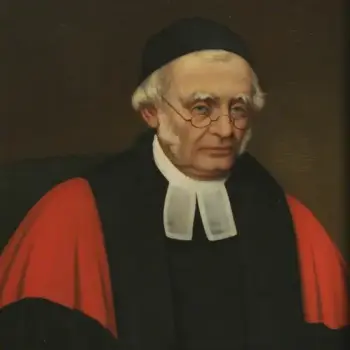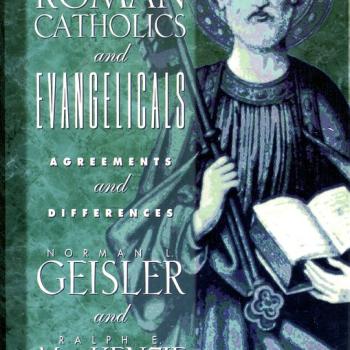
From discussions in a forum devoted to the question of God’s existence: May 2001. Uploaded with full permission of Sue Strandberg (a very friendly, thoughtful, and impressive person), whose words will be in blue.
*****
Hi, Dave;
Welcome to the list. As you can tell, the volume of mail can get heavy at times. I began last summer trying to read each and every letter with careful attention: well, that soon went out the window. It’s enough if I can follow the threads that interest me. This one caught my eye, and although I see that Mike is doing a fine job on his end, I wanted to butt in quickly with an answer to a question you asked atheists in general, since you have been requesting that we try to answer some questions — as a welcome change
My “philosophical commitment” is Secular Humanist, so you needn’t waste time guessing ;)
You wrote:
All makes sense in the end, and there is every reason and incentive to endure evil and suffering when there is ultimately the highest purpose for it. Even Jesus embraced profound suffering; therefore we can as well.
That doesn’t make it a bed of roses for us, by any means, but it is sure a lot easier to endure than under atheist assumptions, where one returns to the dust and ceases to exist, quite often having utterly failed at life, or having been abused their entire life, with nothing significant to ever look forward to. Where is the hope and purpose in that? You tell me; I’m all ears. I truly want to understand how you deal with this ultimate lack of hope or purpose or design, as I would see it.
Our ways of dealing with existential despair and the “sad realities of the world,” as you put it, draw on the same sorts of deep internal values that the theist draws upon in his love for God. We are not really different. Let me try to explain.
My understanding is that most Christians worship and venerate God for many reasons, but chief among these is a deep admiration for God’s manifestation of love in the world. When one has truly recognised in their heart both the sin of their own nature and the perfect goodness of the nature of God, one is overwhelmed with a sense of gratitude for the mercy of God, that He could bestow love upon one so unworthy. As Eric once put it, God’s essential character is such that “there is no occasion where He seeks for personal gratification (the root of evil); rather His motivations are
outward necessarily.”
God’s love for humanity in the face of its gross imperfection is to give a love that is unearned. It is unselfishness, perfect love. And it is this which motivates the Christian towards God. And it is this which the Christian aspires to in his own life, as a model for the best way to live. At least, this is in part the way I see it.
The world, you must agree, contains much good. If it didn’t, you would not have seen anything that pointed towards God. But as you point out, there is much that could cause one to despair. The Good do not always prosper. The Evil are not always punished. There is seemingly pointless suffering, and in the final analysis death is the end for each of us. And you ask the atheist “what gives you hope?”
I suppose one way to get “hope” is to deny that this is the case. But as a Secular Humanist my commitment is not only towards enhancing and enjoying life, but understanding truth. I don’t think the evidence supports either the existence of God or an afterlife. You disagree, I know that. But I don’t intend to get into an argument on this issue right now, I simply want to note that the existence of God is not really a meaning question as such, but an empirical one. It isn’t love of life that separates the atheist from the theist, I think, but what we see as evidence; a desire for consistency and integrity in examining claims and determining their probability. We don’t think it’s true. There you have it.
As Mike pointed out, talking about existential despair is not really an argument for or against the existence of God, but an argument for or against believing in God for one’s own peace of mind and happiness. And I don’t think that arguing oneself into belief based on that is responsible, or honest. I don’t mean that you’re not being honest with yourself in your own belief: as I said just now, you think the evidence points towards the existence of God. I am saying that criticising atheists for lack of belief based on what what this means to our lives is no more justified than if atheists were to claim that you ought to reject what you feel is good evidence for God because it makes your life so complicated and difficult.
A wise philosopher — or maybe it was Ann Landers — once said that “while we can not always choose what happens to us, we can choose how we react.” Atheists don’t feel we have a choice in the matter over an afterlife or a God who watches over us. That is out of our control, we can’t wish or hope one into being, and to choose to deny what we think is true out of a need for “meaning” in life seems to cheapen the very values we hold highest. So if we cannot get what we want, the wise path I think is to want what we get.
The atheist does not consistently think through the “eschatological” implications of his position. Otherwise, I fail to see why he wouldn’t despair, go mad, or become an evil person (pure hedonism or narcissism or sadist or other such excess. Why not?). The easiest way to illustrate this is simply to ask atheists what the purpose of life and the universe is, how you know that; what gives you “hope” and so forth.
Ok, I will try. See if you can understand my point of view:
To love the world in the teeth of what you call the “sad and devastating” truth of our own eventual annihilation; to care about the happiness of other people and the beauty and knowledge we can give our lives today despite our ability to ponder and contemplate our own deaths tomorrow; to seek to establish justice and happiness in a world where neither one may always prevail and we may not always succeed; and to ‘”look the black universe in the face and truly reflect on its lack of any purpose” other than our own, and not flinch but continue to strive for the Good — is to seek to live by a love that is not selfish, but outwards directed. The love the atheist gives to the mindless, empty void of the world is a free gift of pure grace. Can you relate to this? Or is this really so unfamiliar and alien to you?
Atheists must fall back on the equivalent of Christian faith at some point in order to do so, and that they live off the “capital” of the image of God which exists in them whether they accept it or not.
I think you are both very right here, and a little bit wrong. What we live off of isn’t so much the secret hope that God really exists after all and “it will all make sense in the end” and justice prevails and nobody ever dies, but the “capital” of what the image of God means to all humans, whether it exists or not — the belief that a love that is bestowed upon something imperfect, undeserving, and “unworthy” ennobles whatever seeks to give that kind of love. And that through this meaning is created, and purpose achieved.
Please don’t misunderstand me. I am not trying to say that the atheist is more noble or unselfish or loving than the theist. I’m trying to demonstrate that there is really very little difference between us, in the final analysis. You can point to this desire we share and claim that this is evidence for something that originated from God and was given to humanity: we can point to the same thing and say that this is evidence that the concept of God originated in the common desires of humanity. But that is a different argument, isn’t it?
Where we agree is on the value of grace, whether this is granted from the universe outside to ourselves, or ourselves to the outside world. And the hope and purpose isn’t simply waiting for us like a present at the end of a struggle, but is part and parcel of the struggle itself. Meaning isn’t a task, or function, but something we create by the way we live.
You wrote ” God is good; we are His creatures, made in His image, so we are good insofar as we are like Him, and united with Him in purpose and outlook.” As an atheist who does not believe in a literal God, I can still have absolute confidence in the powers ascribed to all the good versions of gods. We are good to the extent that we express our highest aspirations and live by our best principles.
Is this an act of faith? Perhaps, but not faith in the truth of an empirical claim about what exists, but faith in the ability of love and virtue to give meaning to a life to the extent that we make it our purpose and outlook. The universe is only as bleak and despairing as we live it, whether there is a God or not.
As a Humanist, I stand on this. As a Christian, you say your ground is strong only if God exists, otherwise you will fall into madness and despondency. I do not believe that. The same faith that causes you to leap to God would cause you to leap to the things you valued about God if you no longer thought there was one. We are not so different. The existence of God is a fascinating question, but not a critical one.
I could write more, but enough for now I think, it’s getting long. Does this begin to answer your question?
Peace, Love, Harmony, and All That Hippie Crap,
Sue Strandberg (Sastra)
Hi Sue,
Delighted to meet your acquaintance. I hope we will be able to dialogue a lot more in the future; even possibly become good friends (kind of like G. K. Chesterton and George Bernard Shaw were). I don’t think you could have made any better of a first impression. :-)
Your response was nothing less than extraordinary. I was very moved by it. It was eloquent, bridge-building, fascinating, and filled with wise insights. I do like to find common ground with anyone I am dialoguing with, as well as argue (as we all like to do too). I’m the same way with my non-Catholic Christian friends. I enjoy discussing differences (all Christians do, with each other) – I’m quite the Socratic in my passionate love of dialogue -, but I also am concerned about finding common ground as much as possible. I don’t see that the two endeavors exclude each other (many seem to think they do, or at least act like they do).
And this is what impressed me so much about your reply. You did very well in representing, in your words and demeanor (i.e., how you expressed
yourself), the point you were making, that we are not that far apart as people, after all. I would ultimately argue (as you know, no doubt) that that is due to the image of God being in all of us (and the natural law and so forth), but be that as it may, for now, I am just pleased to see that there is a great deal in common in how life and its meaning are viewed, and I’m “basking” in it, so to speak. I suspected as much (I really did, as I have tried to express more than once on this list), but I had never seen this topic written about by a non-Christian, non-religious person, as profoundly as you have done it. Usually, both sides try to run each other down, so this is a most welcome change of pace.
Mainly I was interested in simply “listening” to a heartfelt explanation of an atheist’s basic approach to life and the deepest aspects of it, which indeed we all share, just by being human beings in the same world, with its strange and disturbing mixture of ecstasies and agonies. For that opportunity I am grateful to you. Don’t leave! We have a lot to discuss!
I look forward to that. Thank you for your kind words: like you, I see much more in common among atheists and theists than not. And as for those atheists and theists who hang out in forums such as this one, I think there is a shared passion for ideas and truth which unites us more closely to each other than to others who may share our views, but without reflection or much interest.
You asked in another post if — like [name] — I would agree that I am a humanist first, atheist second. Short answer, yes. Humanism is an approach to life, not a series of dogmatic conclusions. If I were to find I was mistaken about the existence of God I would simply become a religious humanist instead of a secular one.
I have a Catholic friend who told me the other day “if a Christian and a Humanist disagree, then one of them doesn’t understand either Christianity or Humanism.” I’m not certain I’d agree with him completely, but I think he is right that there need be little conflict between the two. In fact, he claims that, properly understood, Christianity leads to humanism. I think the better forms do. E.O. Wilson once wrote that “”Religion will possess strength to the extent that it codifies and puts into enduring poetic form the highest values of Humanity consistent with empirical knowledge.” I agree with that.
Hi folks,
I am very curious about the response of atheists to the following questions. They will likely generate discussion as well, but for myself, I am primarily interested in simply seeing how you would reply, for the sake of my own knowledge, and to understand your point of view better.
I’ll make my answers short, and won’t always be able to meet your criteria, I’m afraid. I suspect my responses will go a long way towards showing the poverty of my background knowledge, but that’s valuable to know, of course, and bound to show anyway. I’ll try to make myself clear and not think too hard, because if I do I won’t ever finish this in time for lunch.
1. What do you make of Jesus? How do you classify him as a person and ethicist? What do you make of his claims to being God in the flesh (assuming that you agree that he made such claims)? Particularly I am interested in your replies to what is referred to as the Trilemma (brought up initially, I believe, by C.S. Lewis, in his Mere Christianity): “Jesus claimed to be God; therefore, the only reasonable and logical response to this is to regard him as either in fact the Lord, or a liar, or a lunatic.”
I am not sure what the historical Jesus may or may not have actually said. That there was an historical Jesus is somewhat debateable, though I think it is very likely. The accuracy of the gospels is also uncertain, since there appears to have been a great deal of religious interpretation which went into them both during and after they were written. Thus, I am far from sure that Jesus actually claimed to be God. I strongly suspect he was a wisdom teacher of approximately the first century who believed he was a messenger of the divine, not God Himself.
My personal opinion then is that while Jesus was not God, neither was he a liar nor a lunatic. He was sincere and no crazier than most people who believe they have a close and insightful relationship with God, meaning not “crazy” at all. I believe many of his teachings were valuable and humanistic in nature; some of his teachings were given under the assumption that the world was about to end and thus inapplicable to living in a world that is not about to end; and some of his teachings, such as the ones on hell and damnation, are not immoral themselves, but do not lead to a loving and responsible attitude or approach to living with others.
2. Please name five or ten Christians whom you consider the most intelligent and intellectually brilliant (and/or culturally influential) of all time, and tell us (briefly) why?
I’m not sure whether you are asking for the names of intelligent, brilliant and influential Christian scholars, or scholars who are these things and also happen to be Christian. Assuming either/or, I would probably include Aquinas, Erasmus, Bacon, Newton, and Locke. This is a short list, of course: any longer and I would be leaving even more people out. ;) All of the above showed insight, clarity, and scope. Each of them were able to look outside of their religious paradigm to incorporate new knowledge, scholarship, or experience either into the religion or into knowledge about the world. Many, though not all, were also Humanists.
I might also include C.S. Lewis, since he has had an enormous amount of modern influence and writes with masterful clarity and ability for the general reader. I enjoy reading him for the narrative and insight into popular Christian beliefs, though it is — from my point of view — like sitting on the lap of a Mr. Rogers who most certainly does NOT like me the way I am. Creepy, and frustrating. But what he does … he does very well (as Noel Coward said about Liberace.)
3. Please name five or ten Christians from history whom you admire the most [I’m thinking more about character here, rather than merely intellect], and tell us (briefly) why?
St. Francis of Assisi — because I admire his humility and kindness. Erasmus again, because his humanistic approach to the Christian world helped to bring the Middle Ages into the Renaissance, and revealed not only a skilled mind, but a good heart. George Fox, who founded the Quakers and introduced a simplicity and concern for character which contributed to the humanization of society and the end of slavery. Johann Sebastian Bach, whose love of God was the inspiration for some of the most beautiful music ever written, and whose meticulous commitment to his art still enhances the world today.
And Bishop John Shelby Spong, whose humanistic version of Christianity is the one which makes the most sense to me on an emotional as well as intellectual level — and who had the incredible self-restraint and integrity to examine and then renounce his strong belief in the power of prayer when his wife’s cancer went into remission after she was prayed for.
4. Please name five or ten Christians from history that you despise and detest the most and consider the most harmful to society and culture, and tell us (briefly) why?
This is actually more difficult. :) Tertullian, St. Augustine, Torquemada, John Calvin, the Televangelists (pick one.) All show an anathema towards the principles of humanism and its ethics, and a chilling willingness to live by it — and impose it on others.
5. Who is the greatest living Christian philosopher, and the greatest of all time, and (briefly) why?
Difficult. Probably Aquinas for all time, because his attempted synthesis of Eastern mysticism and Greek philosophy lead to some of the most influential theology and apologetics in history. Possibly Swinburne for today.
6. Who is the greatest living atheist philosopher, and the greatest of all time, and (briefly) why?
Again, philosopher who is an atheist, or a philosopher of atheism? Most of the great philosophers of atheism were theists. As for today, I am partial to Flew, who is still alive [Dave: Flew became a deist three years after her statement], though I have far more books by Paul Kurtz. I know they may not be on the level of Greatness, but I have trouble picking someone I don’t like to read and spend money for ;)
7. What is the one single argument or proof which would have the greatest potential for proving to you that Christianity were true?
Scientific evidence for the paranormal/supernatural which is then accepted by the mainstream scientific community. Unless the supernatural exists, then God’s existence is problematic. Unless God exists, Christianity is moot. This would not of course be the only argument or proof that would persuade me, but it is the one that would have the greatest potential, which is what you asked.
8. How many of you used to be Christians, and what denomination? At what age did you cease becoming a Christian, and (briefly), why?
I was not raised Christian, but Freethinker. I was New Age during my teens, liberal Christian briefly in my 20’s (Quaker), and agnostic and then atheist as my definitions became sharper. In explanation — very briefly indeed — it became implausible to me that the fundamental nature of the universe either was or could be a special secret shared only by the enlightened through intuition or revelation. I lost my faith in the power and ability of the human mind to make direct connections with transcendent knowledge, and became more certain that our knowledge ought to be provisional and the evidence open to all.
9. What is the most intellectually and morally respectable religion (if an atheist were to choose one; the “lesser of the evils,” so to speak)? If you select Christianity, please also narrow that down to a denomination, if you can, and also tell us which Christian denomination you regard as the least intellectually and morally respectable (or which non-Christian religion, as the case may be), and briefly explain your rationale for all these answers.
The religions with fewer assumptions and less anthropomorphism (God like a Person) seem less unlikely to me. Zen Buddism and Taoism seem to lead not only to a better self-awareness, but a kinder and more accepting attitude towards others. I enjoy reading “pop” zen, and find it entirely consistent with Humanism in its ethics, if not epistemically. I’ve a brother who is Zen, and he lends me his books sometimes. The Eastern views of ‘God’ are much grander in many ways than Western views, and more consistent with what I would expect God to be like.
Christianity, with its claim that a Personal God intervenes in earth history and came to earth as a man — and this was done in order to have an atoning sacrifice for payment of ‘sin’ — doesn’t even seem remotely plausible to me, though I try hard to suspend my disbelief in order to give it a fair hearing on its own ground. I would view Quaker and Unitarian (heh) as most honorable, Calvinism and Pentecostal as not only least likely, but least morally respectable given what can be legitimately derived from their premises.
As for nonchristian religion, the Thuggees usually win the #atheism contests of “religion that sucks the most.”
10. If you had one thing to say to a Christian, in terms of the falsity of their religion, and to persuade them of that (say you had two minutes before a nuclear bomb was to hit), what would it be (briefly)? And what would be your corresponding single greatest quick defense of the atheist position?
I’m going to ignore the part about the nuclear bomb about to drop, since it puts a rather strange and bizarre twist to apologetics (under those circumstances I cannot imagine making metaphysical arguments.) I think you simply want something quick and simple and off the cuff. If I had only a couple of minutes, I would probably point out that Theism puts an enormous amount of faith in the human propensity to put things into human terms, and that we have good evidence that our doing so is false in many cases. I would appeal to consistency. I would take the next two minutes to continue the same argument.
11. What troubles you the most about the atheist worldview (for me, with regard to my Christian belief, it is the problem of evil)?
I’m not sure here if you’re asking what troubles me the most given my belief that atheism is true, or what most troubles my belief that atheism is true. If it’s the former, it would be my eventual death and permanent subsequent nonexistence. As Woody Allen once said, “I don’t want to become immortal by living on in my works: I want to become immortal by not dying.” I have a lot of sympathy with that ;) Truths are not always easy to accept.
If it’s the latter, then I would say that I consider arguments on the nature of consciousness and qualia to be the most difficult, coupled with the problems of immaterial existants and their nature.
12. What is your greatest single criticism of Catholicism?
I have always admired the Catholic attitude towards the salvific character of Works, since it is by this back door that propositional belief in the resurrection of Jesus can become less critical than belief in the values that Jesus stood for, and Christianity becomes more ethically respectable. My greatest criticism might be what I consider to be the almost schizophrenic tendency Catholicism often has in embracing humanism, science, scholarship, and tolerance with one hand and then pandering to superstition, miracles, belief in demons, and intolerance with the other. I always have to find out what kind of Catholic I am speaking to — sometimes at the moment.
Thanks. I look forward very much to your responses. I think this will be a lot of fun for everyone.
Heh, this survey was a bear, and you know it. Too much, and intimidating as Hell itself. Each question would take volumes to answer. Sheesh. I only had fun because I didn’t think too hard on this and answered as casually and quickly as I could in the amount of time I have before I eat. I suspect all these answers will now come back and bite me, but then you will have the fun, so it evens out ;)
Hi Sue,
Another extraordinary effort. I think I will post your first post to me (which I praised highly at the time), together with this, on my website, as very impressive examples of a respectable atheist worldview. Very rarely do I ever present on my website an opposing viewpoint without counter-argument (since it would be rather counter-productive to my apologetic enterprise LOL), so I hope you regard this as the gesture of respect and appreciation that it is meant to be.
On the other hand, I suppose – upon reflection – that this would be part and parcel of my ecumenical outlook. Ecumenism is the effort to acknowledge and rejoice in common ground with those of other faiths and beliefs (without for a moment denying differences). I find much commonality between us, so to further and promote that is to be ecumenical and hence, to be Catholic (as this is a large emphasis of our Church today). The pope prays with Muslims – he even kissed the Koran – , Jews, Orthodox, and various Protestants, apologizes for past sins of Catholics, builds bridges; I absolutely love that (especially as a former Protestant and secularist myself).
I think many Christians see an inherent conflict between apologetics and ecumenism which I don’t see (I think they are entirely complementary). But that’s a whole ‘nother subject.
Reading your reply to the survey, I think I realized again (as with your initial post) that indeed there is a large amount of common ground between atheists and Christians, in terms of “humanism,” broadly defined. I.e., humanism as a certain way of approaching reason, life, art, science, thought, culture, ideas, tolerance, ethics, and so forth. Erasmus was a Christian humanist, as was Thomas More. I have great admiration for both of them, and you admire Erasmus a lot. If we were to examine why that is, I think we would find much of the common ground to which I refer.
I wonder what you think of John Henry Newman. He might be regarded as a Christian humanist (especially with regard to his philosophy of education). At any rate, I think he was an extraordinary thinker, and he is one of my own Catholic and intellectual heroes. C.S. Lewis is my favorite writer, so I was delighted to hear of your high regard for him. Incidentally, on my Chesterton site, I have a link to a debate between GKC and George Bernard Shaw.
And yes, quick, off-the-cuff answers were precisely what I was looking for. Far better that, than excruciatingly-thought-out philosophical answers (I won’t descend into my usual pet peeves on that score). This was very interesting to me, and no, I am not planning on responding in any oppositional sort of way. With this thread I’m strictly seeking to learn more about atheism and atheists. I’ve learned quite a bit thus far, thanks to you, and the others who responded.
Just my $0.02 worth.
***
(originally 5-25-01)
Photo credit: geralt (July 2018) [Pixabay / Pixabay License]
***













